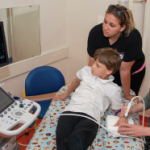A group of experts then convened to determine the feasibility of an ACR certification program. The first step involved a comprehensive survey of the entire ACR membership to gather feedback on MSUS use and interest in certification. Over 80% of the respondents said the ACR should offer MSUS certification for individual rheumatology healthcare providers, and 84% said they would elect to become certified if there was a program available in the U.S. The most influential reasons cited to become certified were:
- To enhance the effectiveness of treatment or diagnosis;
- To learn completely new skills or knowledge;
- To increase competence in current job;
- To maintain or improve current skills or knowledge;
- To keep up to date professionally;
- Proof of competency to show payers/insurers; and
- Expand services provided by the practice/institution.
The next steps involved consultation with Castle Worldwide—one of the nation’s leading certification and licensure testing companies—to conduct a comprehensive job task analysis. The role of the job task analysis was to provide a clear definition of the primary domains, specific task statements, and related knowledge and skills required for competent performance as a certified MSUS professional. Data from the job task analysis supported the development of a specialty certification program and provided a blueprint that could be used for a potential certification program.
A scan of the current healthcare environment involving MSUS was also explored, and it became apparent that, in the future, standards for MSUS will be set. Stan Cohen, MD, ACR past president, states, “My feeling, as well as [the feeling of] others, was that we needed to ensure the competency of our members performing ultrasound. By codifying the competency, we could ensure the ability of rheumatologists to perform in-office ultrasound and be reimbursed for their efforts. Without this process in place, others would try to limit musculoskeletal ultrasound by rheumatologists in the future, as resources for healthcare continue to shrink.”
After careful consideration of the job task analysis, membership survey, and environmental scan, the decision to move forward with a certification was made, and the following goals of the program established:
- Promote quality of care and patient safety through the certification and continuing competency of physicians, physician assistants, and nurse practitioners who perform ultrasound as part of their practice in rheumatology.
- Increase the knowledge and improve competence of physicians, physician assistants, and nurse practitioners who perform ultrasound as part of their practice in rheumatology.
- Provide a voluntary pathway for physicians, physician assistants, and nurse practitioners who perform ultrasound as part of their practice in rheumatology to demonstrate competence to patients, peers, and payers/insurers.
To learn more about the RhMSUS program and how to apply, visit www.rheumatology.org/RhMSUS or contact Katie Duggan, director of certification, at [email protected] or (404) 633-3777, ext. 108.
